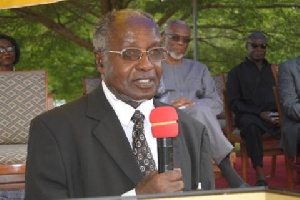 A former Vice Chancellor of the University of Ghana, Professor Ivan Addae-Mensah
A former Vice Chancellor of the University of Ghana, Professor Ivan Addae-Mensah
Professor Ivan Addae-Mensah, a former Vice Chancellor of the University of Ghana, has called for a critical look at the funding of the Free Senior High School (SHS) Policy to ensure its sustainability.
He said providing quality and equitable education entailed a lot of cost, probably more cost than the cost of increasing access.
“You can increase access by making the financial burden of education on the individual less burdensome, and providing infrastructure but quality can only be improved if the conditions under which educators work are made more attractive,” he said.
Prof Addae-Mensah said this on Monday at the launch of the Global Action Week for Education 2018.
The Week, which is being organised by the Ghana National Education Campaign Coalition (GNECC), is on the theme: “Strengthening Citizen Participation and Accountability in Education Management: A Milestone for Achieving Sustainable Development Goal (SDG) Four”.
He said pupil to teacher ratio, especially at many of the public schools, was poor and had to be addressed.
“We have recently introduced the Free SHS system, this is perhaps one of the boldest educational reforms decisions taken in this country since independence,” he said.
“Now we have a situation in which whether a person can afford to pay for his or her education, it is provided free of charge. This has its implications on quality and equity,” he said.
Prof Addae-Mensah said experience over the years since 1951 had shown that whenever governments took on direct financing of education without any or very little contribution from parents, quality suffers because governments were unable to meet their obligations in good time, if at all, and sustain the necessary financial outlays required.
He said those aspects of the implications of the Fee SHS would need to be critically and dispassionately looked at without political colouration, so that the scheme could become permanent and sustainable.
He noted that the present experiment would only succeed if government would be able and willing to provide the necessary financial administrative and personnel support for the scheme.
Prof. Addae-Mensah said the Government should not put unnecessary restrictions on parents who were able, willing and prepared to contribute to their children’s education in the public schools through their Parent Teacher Associations.
He said the whole issue of funding education in general and pre-tertiary education in particular would need to be re-examined.
Prof. Addae-Mensah cited a 2010 Report on Sustainable Funding of Education from Pre-school to Tertiary Level, produced by the National Council for Tertiary Education at great cost.
He disclosed that he was the co-chair of that Committee, adding “My other co-chairman of that Committee was well known Prof Jophus Anamoah-Mensah,” he said.
“It was a very comprehensive and far reaching report, unfortunately, immediately Professor John Evans Atta-Mills, who commissioned the report left office the succeeding government simply ignored it and was never implemented,” Prof Addae-Mensah said.
“I will strongly suggest that the present government revisit that report to see if it can glean from it some ideas for providing for sustainable quality education beyond just the mere facilitation of access,” he said.
Dr Esther Ofei-Aboagye, a former Director of the Institute of Local Government Studies, who chaired the function, urged the Government to ensure that the councils and governing boards for colleges of education were constituted.